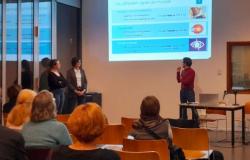With the development of artificial intelligence (AI), many decision support tools today appear promising and have reached an interesting level of maturity. “So we tried to see their interest in geriatrics,” explains Professor Achille Tchalla (Limoges University Hospital), head of the “AI and aging well” chair.
In order to help medical care teams in nursing homes to better manage complex situations and avoid unnecessary emergency admissions, while optimizing medical and nursing staff time, Professor Tchalla experimented with a pre-diagnosis system, analyzed by artificial intelligence. A first feasibility phase tested the AI tool and its uses with nursing staff in nursing homes. A second stage made it possible to evaluate this system on a regional scale.
With this system, nurses in nursing homes identify, on a tablet, the patient’s symptoms based on a pre-established questionnaire analyzed via AI. The information is then transmitted to the attending physician, who no longer needs to travel.
Good sensitivity
“It is a decision-making tool which in no way replaces medical expertise. The doctor in his office is in the loop to validate the direction decided by the AI. The results of the study should be published soon including a quantitative, but also a qualitative, component. indicates the geriatrician. Already“a sociological evaluation showed that the system was well accepted by the nursing home teams. And while waiting for the first results to be revealed, we can say that this connected tool has good sensitivity: the accuracy of the AI diagnoses has been verified. The diagnosis is also faster and avoids transfers to the emergency room. specifies Professor Achille Tchalla.
Many other projects are underway at the geriatrics department of Limoges University Hospital, around intelligent remote monitoring at home or in nursing homes for patients with chronic pathologies, in order to quickly anticipate decompensation and avoid hospitalization.
Interview with Professor Achille Tchalla (Limoges University Hospital, head of the “AI and aging well” chair)
Health






